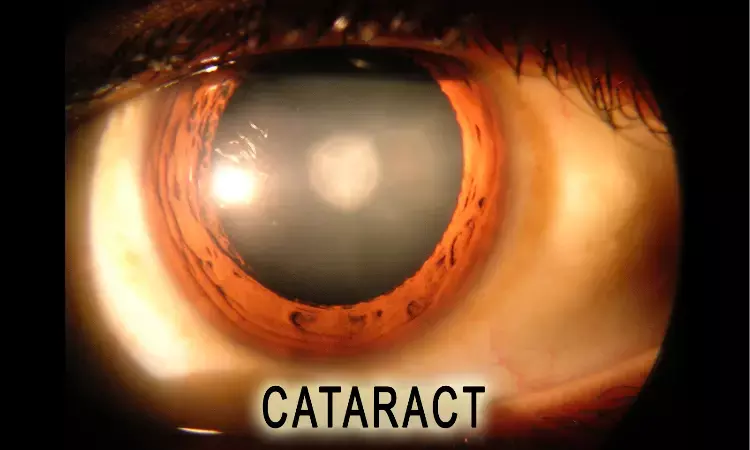- Home
- Medical news & Guidelines
- Anesthesiology
- Cardiology and CTVS
- Critical Care
- Dentistry
- Dermatology
- Diabetes and Endocrinology
- ENT
- Gastroenterology
- Medicine
- Nephrology
- Neurology
- Obstretics-Gynaecology
- Oncology
- Ophthalmology
- Orthopaedics
- Pediatrics-Neonatology
- Psychiatry
- Pulmonology
- Radiology
- Surgery
- Urology
- Laboratory Medicine
- Diet
- Nursing
- Paramedical
- Physiotherapy
- Health news
- Fact Check
- Bone Health Fact Check
- Brain Health Fact Check
- Cancer Related Fact Check
- Child Care Fact Check
- Dental and oral health fact check
- Diabetes and metabolic health fact check
- Diet and Nutrition Fact Check
- Eye and ENT Care Fact Check
- Fitness fact check
- Gut health fact check
- Heart health fact check
- Kidney health fact check
- Medical education fact check
- Men's health fact check
- Respiratory fact check
- Skin and hair care fact check
- Vaccine and Immunization fact check
- Women's health fact check
- AYUSH
- State News
- Andaman and Nicobar Islands
- Andhra Pradesh
- Arunachal Pradesh
- Assam
- Bihar
- Chandigarh
- Chattisgarh
- Dadra and Nagar Haveli
- Daman and Diu
- Delhi
- Goa
- Gujarat
- Haryana
- Himachal Pradesh
- Jammu & Kashmir
- Jharkhand
- Karnataka
- Kerala
- Ladakh
- Lakshadweep
- Madhya Pradesh
- Maharashtra
- Manipur
- Meghalaya
- Mizoram
- Nagaland
- Odisha
- Puducherry
- Punjab
- Rajasthan
- Sikkim
- Tamil Nadu
- Telangana
- Tripura
- Uttar Pradesh
- Uttrakhand
- West Bengal
- Medical Education
- Industry
New Artificial Lens May obviate need of glasses after cataract surgery

NEW ORLEANS, La. - Cataract surgery is one of the most successful medical procedures with a success rate of about 97 percent, it is not uncommon for people to still need glasses after surgery, especially reading glasses.
A new study has shown that a new kind of artificial lens allowed over 90 percent of patients to see well enough that they no longer needed glasses.
The study was presented at AAO 2021, the 125th annual meeting of the American Academy of Ophthalmology.
A cataract is the clouding of the eye's natural clear lens. During cataract surgery, an ophthalmologist surgically removes the cloudy lens and replaces it with an artificial lens called an intraocular lens (IOL). The most common IOL type is a monofocal IOL and it allows people to see well at distance, but it can't fix presbyopia, that annoying part of aging that slowly robs people of their near vision.
Researchers have been working for years to develop a presbyopia correcting IOL that can correct the full range of vision: up close, at arms-length, and far away. While these presbyopia correcting IOLs can correct near or intermediate vision, they don't effectively correct the full range of vision. This new IOL attempts to change that by combining two presbyopia-correcting IOL technologies, multifocal and extended depth-of-focus, to achieve full vision correction. It's called the Tecnis Synergy from Johnson & Johnson Vision. The U.S. FDA approved the Tecnis Synergy IOL in May 2021.
In the study presented today, researchers in Bakersfield, Calif. and 14 other sites across the U.S. compared visual outcomes in patients who received either a monofocal IOL or the new presbyopia correcting IOL during cataract surgery. Of the 272 patients enrolled in the study, 88 percent of those who received the Tecnis Synergy presbyopia correcting IOL never used glasses compared with just 3 percent in the monofocal IOL group.
"My career goal has always been to conquer presbyopia—before it conquers me," said lead researcher Daniel H. Chang, MD. "This lens is a key addition to our ability to treat presbyopia. The Tecnis Synergy provides the best near vision of any lens I've ever used. For patients not wanting glasses, this is the lens I recommend."
Hina Zahid Joined Medical Dialogue in 2017 with a passion to work as a Reporter. She coordinates with various national and international journals and association and covers all the stories related to Medical guidelines, Medical Journals, rare medical surgeries as well as all the updates in the medical field. Email: editorial@medicaldialogues.in. Contact no. 011-43720751
Dr Kamal Kant Kohli-MBBS, DTCD- a chest specialist with more than 30 years of practice and a flair for writing clinical articles, Dr Kamal Kant Kohli joined Medical Dialogues as a Chief Editor of Medical News. Besides writing articles, as an editor, he proofreads and verifies all the medical content published on Medical Dialogues including those coming from journals, studies,medical conferences,guidelines etc. Email: drkohli@medicaldialogues.in. Contact no. 011-43720751


